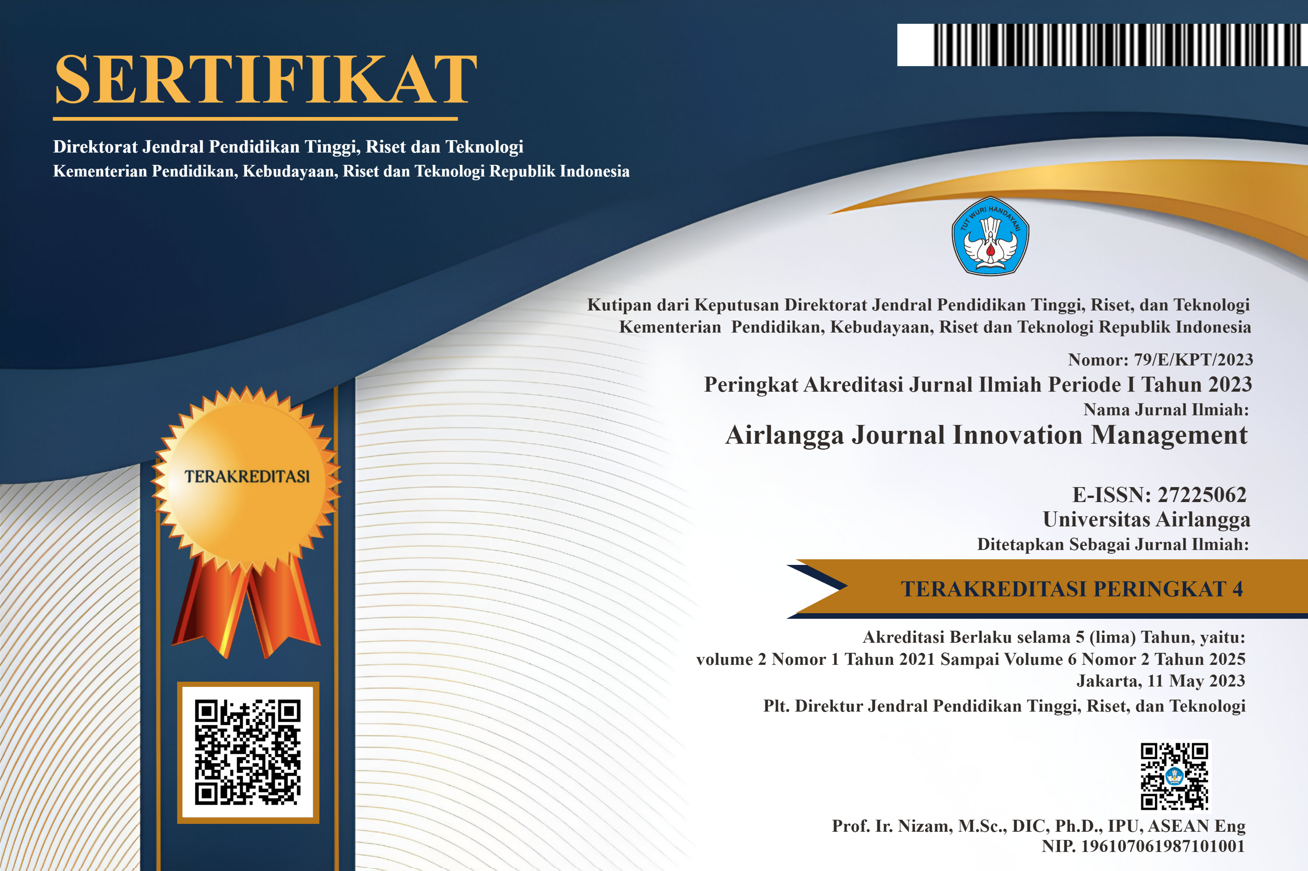Mutual Fund Investment: Investment Alternatives for Beginner Investors
Downloads
This study aims to observe the phenomena related to mutual fund investment as an alternative investment for beginner investors in Indonesia. It employs a post-positivism model of Systematic Literature Review (SLR), with data gathered from the Scopus website. A total of 36 documents from previous studies, published between 1975 and 2025, were analyzed. The findings reveal that mutual fund investment is a popular choice for inexperienced investors seeking to minimize risks commonly associated with direct investment in the capital market. Mutual funds offer several benefits, including professional fund management, portfolio diversification, transparency of information, high liquidity, low transaction costs, and generally lower risk compared to direct stock investments. In addition, rapid technological advancements have led to the emergence of digital platforms and applications that simplify the process of investing in mutual funds. These innovations enhance user accessibility and convenience, making it easier for new investors to participate in the capital market. The implication of this research is to provide better insight into the strengths and weaknesses of each investment platform or application, thereby assisting novice investors in making more informed and strategic investment decisions. Ultimately, this can help them to achieve their financial goals more effectively while minimizing potential losses.
Abraham, I., & Supriyati, Y. (2022). Desain Kuasi Eksperimen Dalam Pendidikan: Literatur Review. Jurnal Ilmiah Mandala Education (JIME), 8(3), 2476–2482. https://doi.org/http://dx.doi.org/10.58258/jime.v8i3.3800
Adelia, F., Safitri, L., Azzahra, N., Ramli, R., & Lubis, P. K. D. (2024). Reksa Dana Solusi Investasi
Terpadu bagi Investor Pemula. TRILOGI: Jurnal Ilmu Teknologi, Kesehatan, Dan Humaniora, 5(2), 307–315.
Adhi, N., Aji, D. P., & Winarni, W. (2021). Reksadana syariah dan konvensional di Indonesia. Keunis, 9(2), 120–131.
Adhianto, D. (2020). Investasi Reksa Dana Sebagai Alternatif Investasi Bagi Investor Pemula. Jurnal E-Bis (Ekonomi-Bisnis), 4(1), 32–44. https://doi.org/10.37339/e-bis.v4i1.242
Ahmad, G. N., Widyastuti, U., Susanti, S., & Mukhibad, H. (2020). Determinants of the islamic financial literacy. Accounting, 6(6), 961–966. https://doi.org/10.5267/j.ac.2020.7.024
Amarta, C. C., & Anjelina, J. D. (2023). Inovasi Bank Kustadion Pada Aplikasi Reksadana Syariah Bibit. Revenue Manuscript, 1(1), 69–77.
Andrea, J. A., & Suroso, J. S. (2022). Analisis Faktor-Fator yang Mempengaruhi Penggunaan Aplikasi Investasi Reksadana Online pada Generasi Millenial dan Generasi Z. ITEJ (Information Technology Engineering Journals), 7(1), 32–52.
Arifin, Z., & Mulyati, S. (2021). Investment Strategy in Sharia Mutual Funds: Case Study on the Indonesian Capital Market. Asia-Pacific Research in Social Sciences and Humanities Universitas Indonesia Conference (APRISH 2019), 434–440.
Azaria, M. J. F., Tubastuvi, N., Purwidianti, W., & Aryoko, Y. P. (2024). Gen Z Investment Decision: Role of Financial Literacy, Financial Behaviour, Financial Experience and Risk Tolerance. AJIM (Airlangga Journal of Innovation Management), 05(04), 721–739.
Dewi, E. K. (2013). Analisis Investasi Reksadana Sebagai Alternatif Investasi Di Masa Depan. Jurnal INTEKNA (Edisi Khusus), 13(3), 235–241.
Dharmastuti, C. F., & Dwiprakasa, B. (2017). Karakteristik Reksa Dana Dan Kinerja Reksa Dana Saham Di Indonesia. Jurnal Ekonomi, 22(1), 52–67. https://doi.org/10.24912/je.v22i1.181
Dja’akum, C. S. (2014). Reksa Dana Syariah. Az Zarqa’, 6(1), 83–102.
Fauzi, Q., Ulfah, U., & Wijayanti, I. (2024). Ethical challenges in transportation: A study on the implementation of Islamic business values. Al-Uqud: Journal of Islamic Economics, 8(2).
Firdaus, M. I., Aziz, M. A., & Hoh, S. (2022). Mekanisme Reksadana Syariah Melalui Aplikasi Bibit Perspektif Akad Wakalah bil Ujrah. Al-Mustashfa: Jurnal Penelitian Hukum Ekonomi Islam, 07(02), 171–181.
Halim, A. (2005). Analisis Investasi. Salemba Empat.
Hengki Wijaya. (2018). Analisis Data Kualitatif Model Spradley (Etnografi). Sekolah Tinggi Theologia Jaffray, 3(1), 1–9.
Hidayat, A. N., & Diana, D. (2024). Navigating Islamic Investments: The Role of Islamic Financial Literacy, Religiosity, and Motivation using PLS-SEM. AJIM (Airlangga Journal of Innovation Management), 05(02), 278–290.
Inayah, I. N. (2020). Prinsip-Prinsip Ekonomi Islam Dalam Investasi Syariah. Urnal Ilmu Akuntansi Dan Bisnis Syariah (AKSY), 2(2), 89–100.
Indriani, R., & Budyastuti, T. (2021). Analisis kinerja reksadana konvensional dan reksadana syariah untuk keputusan investasi investor. Jurnal Akuntansi, Keuangan, Pajak Dan Informasi (JAKPI), 1(1), 63–76.
Karno, R., & Martinouva, R. A. (2021). Investasi Reksadana Syariah Di Aplikasi Bibit. ASAS: Jurnal Hukum Ekonomi Syariah, 13(2), 117–124.
Keuangan, O. J. (2019). Reksa Dana: Investasi Pas Bagi Yang Serba Terbatas. https://doi.org/https://sikapiuangmu.ojk.go.id diakses pada 25 September 2024, pukul 19.09
Keuangan, O. J. (2024). Reksadana: Manajer Investasi.
Khomisah, Perangin-angin, L. B., Hapitasari, S. W., & Dasman, S. (2025). Evaluasi Kinerja Investasi Emas Dan Saham: Tinjauan Dari Perpektif Risiko Dan Return. Jurnal Pemasaran Bisnis, 7(1), 162–173.
Mahyuda, I. S., Putri, F. R., & Putri, B. S. (2021). Urgensi Reksadana sebagai Salah Satu Opsi Investasi untuk Meningkatkan Jumlah Investor di Indonesia. Jurnal Pendidikan Tambusai, 5(3), 11088–11093.
Marwini, M., & Salam, A. N. (2023). The Concept of Islamic Social Finance Development Based on Financial Technology to Realize a Prosperous Society. Jurnal Ilmiah Ekonomi Islam, 9(3), 3406–
Mary, M., Mediawati, E., & Adirestuty, F. (2019). The Analysis of Third-Party Funds, State Sukuk, and Corporate Sukuk Towards Financial Deepening in Indonesia. Review of Islamic Economics and Finance, 2(2), 53–66.
Maulida, A. Z., Risdiana, R., & Purnomo, A. (2023). Performance of Indonesia’s Sharia Capital Market for the 2022 Period. Journal of Islamic Economics and Philanthropy, 5(4), 97–113. https://doi.org/10.21111/jiep.v6i2.9369
Mukhamad Zakariya. (2017). Pertumbuhan Lembaga Reksadana Syariah Di Indonesia. Jurnal Ekonomi Syariah (JES), 2(1), 114–122.
Nadhirrahman, F., & Kholilul Rohman, I. (2022). Intensi Masyarakat Milenial Dalam Berinvestasi Reksa Dana Syariah Di Era Pandemi Covid 19. Jurnal Tabarru’: Islamic Banking and Finance, 5(2), 526–539.
Nuryahya, E., Mahri, A. J. W., Nurasyiah, A., & Adiresuty, F. (2022). Technology acceptance of zakat payment platform: An analysis of modified of unified theory of acceptance and use of technology. Al-Uqud: Journal of Islamic Economics, 6(1), 142–159.
Pamungkas, A. S., Budiono, H., Wijayanto, H., & Widjaya, H. (2019). Pelatihan pengenalan investasi reksadana untuk pelajar SMK Ariya Metta. Sabdamas, 1(1), 133–140.
Paningrum, D. (2022). Buku Referensi Investasi Pasar Modal. Lembaga Cakra Brahmanda Lentera.
Pariela, M. V. G. (2018). Wanprestasi Manajer Investasi Terhadap Investor Reksadana. Sasi, 23(2), 129. https://doi.org/10.47268/sasi.v23i2.100
Permana, S. D. H., Bintoro, K. B. Y., & Syahputra, A. (2022). Memulai Investasi Melalui Platform Investasi Digital. Jurnal Industri Kreatif Dan Informatika Series (Jikis), 02(01), 34–38.
Putra, I. R. N., & Moelyani, I. A. (2021). Analisis Metode Dollar Cost Averaging Sebagai Strategi Investasi Paling Efektif Untuk Investor Pemula. Prosiding Seminar Nasional Riset Pasar Modal, 1(1), 1–8.
Putro, W. (2016). Bareksa, Perusahaan Teknologi Pertama yang Mendapat Lisensi Penjual Reksadana.
Rinjani, A. D. A., & Prehanto, D. R. (2021). Analisis Kepuasan Pengguna Aplikasi Bibit Reksadana Menggunakan Metode EUCS Dan IPA. Jutisi: Jurnal Ilmiah Teknik Informatika Dan Sistem Informas, 10(2), 123–136.
Roynaldi, D. (2021). Reksadana dalam Prespektif Syari’ah. Jurnal Tahkim, 17(1), 148–158.
Ryandono, M. N. H., Kusuma, A., Maryani, A., & Wijayanti, I. (2022). Factors influence online donation during COVID-19 pandemic. Al-Uqud: Journal of Islamic Economics, 6(1), 66–83.
Ryandono, M. N. H., Wijayanti, I., & Kusuma, K. A. (2020). Determinants of Investment In Islamic Crowdfunding. Muqtasid: Jurnal Ekonomi Dan Perbankan Syariah, 11(1), 70–87.
Sahrul, M., Aulia, N. T., & Resti, R. (2022). Studi Komparasi Aplikasi Investasi Online Berbasis Mobile. Researchgate, 8(6), 1–11.
Siddiq, I., Juliana, J., & Adirestuty, F. (2020). Shariapreneur Interest: Analysis Of Sharia Business Knowledge and Motivation (Studies On Students Of The Islamic Economics Study Program Bandung City Universities. Review of Islamic Economics and Finance, 3(2), 80–90.
Simu, N. (2019). Kinerja Reksadana Saham di Situs Bareksa. Management and Accounting Expose, 2(2), 73–84.
Sudirman, & Alhudori, M. (2018). Pengaruh Konsumsi Rumah Tangga, Investasi Terhadap Pertumbuhan Ekonomi Di Provinsi Jambi. EKONOMIS: Journal of Economics and Business, 2(1), 81–91.
Susilo, A. A. (2017). Investasi Reksa Dana Syariah. Iqtishodiyah : Jurnal Ekonomi Dan Bisnis Islam, 3(1), 19–35.
Susilowati, E. (2024). Analisis Risiko Dan Ketidakpastian Dalam Investasi Properti Komersial (Retail) Dan Properti Industri. Jurnal Sekretari & Administrasi (Serasi), 22(01), 26–36.
Syafa’ah, N. L., & Aeni, N. (2020). Pengaruh Tingkat Return Dan Risk Terhadap Keputusan Berinvestasi Di Reksadana Syariah. IHTIYATH: Jurnal Manajemen Keuangan Syariah, 4(1), 46–58.
Wijayanti, I. (n.d.). Analisis Penerapan Qawaid Fiqiyyah Terhadap Kebijakan Belanja Pegawai Pemerintah Dalam Pelaksanaan APBN Di Indonesia. BOOK-5: EKONOMI ISLAM, 941.
Wijayanti, I., Herianingrum, S., & Ryandono, M. N. H. (2020). Islamic Crowdfunding Mechanism to
Answer Renewable Energy Investment Challenge in Indonesia. Test Engineering and Management, 83, 3596–3605.
Wijayanti, I., Ryandono, M. N. H., & Petra, D. H. S. P. H. (2021). Financial Inclusion through Zakat Institution: Case Study in Indonesia and Brunei Darussalam. International Journal of Islamic Business and Economics (IJIBEC), 5(2), 128–140.
Yudha, A. T. R. C., Huda, N., Maksum, M., Sherawali, S., & Wijayanti, I. (2024). The Moderating Effect of Religiosity on Fashion Uniqueness and Consciousness in Halal Fashion Purchase. Indonesian Journal of Halal Research, 6(2), 71–84.
Zakik, Z., Kamil, A., Prasetyo, A. S., Ryandono, M. N. H., & Wijayanti, I. (2022). Economic development on Madura Island through halal tourism: A business feasibility study. Al-Uqud: Journal of Islamic Economics, 6(2), 289–303.
Copyright (c) 2025 Airlangga Journal of Innovation Management

This work is licensed under a Creative Commons Attribution-NonCommercial-ShareAlike 4.0 International License.
- The journal allows authors to hold copyright without restrictions and retain publication rights without restrictions. The author retains the copyright and grants the first publication rights to the journal, with his work simultaneously licensed under the Creative Commons Attribution-NonCommercial-ShareAlike 4.0 International License (CC BY-NC-SA). This license allows others to share the work with acknowledgment of authorship and initial publication in this journal, provided that the work is not used for commercial purposes and that any derivative works must use the same license.
- Authors may enter into additional contractual agreements for non-exclusive distribution of the journal publication version (e.g., uploading it to an institutional repository or publishing it in book form), while still including acknowledgment of the initial publication in this journal.
- Authors are allowed and encouraged to upload their work online (e.g., in an institutional repository or personal website) before and during the submission process. This can support productive scientific exchanges as well as increase citations to published works.

AJIM by UNAIR is licensed under a Creative Commons Attribution-NonCommercial-ShareAlike 4.0 International License.





















